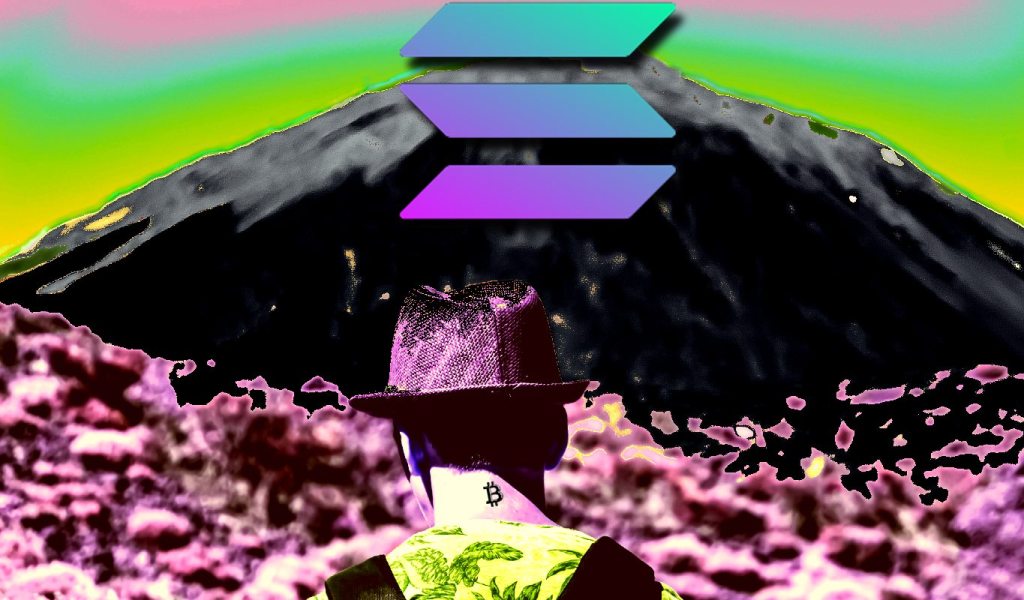
Peer-to-peer file storage network Filecoin (FIL) is collaborating with smart contract platform Solana (SOL) for decentralized blockchain storage solutions. In a new thread on the social media platform X, the team behind Filecoin says that integrating with Solana will greatly enhance the Ethereum (ETH) rival’s capabilities as well as advance the concept of decentralized storage. […]
The post Filecoin Announces Integration With Solana (SOL) for Decentralized Blockchain Storage Solution appeared first on The Daily Hodl.
 Solana Mobile, Solana Labs’ smartphone subsidiary, processed over $20 million in payments in alliance with Shopify and USDC, the second-largest dollar-pegged stablecoin. Anatoly Yakovenko, a co-founder of Solana Labs, explained that 51% of Chapter 2’s payments were completed using USDC, with no payment processing fees associated. Solana Mobile Processed Over $20 Million in USDC Payments […]
Solana Mobile, Solana Labs’ smartphone subsidiary, processed over $20 million in payments in alliance with Shopify and USDC, the second-largest dollar-pegged stablecoin. Anatoly Yakovenko, a co-founder of Solana Labs, explained that 51% of Chapter 2’s payments were completed using USDC, with no payment processing fees associated. Solana Mobile Processed Over $20 Million in USDC Payments […]
Solana (SOL) co-founder Anatoly Yakovenko is unveiling one of the most impactful innovations that’s emanated from the crypto industry In a new interview with macro guru Raoul Pal, Yakovenko says that decentralized finance (DeFi) is possibly the best thing that came out of crypto. “DeFi is the most important app for crypto. It is the […]
The post This Is the Most Important App for Crypto, According to Solana (SOL) Creator Anatoly Yakovenko appeared first on The Daily Hodl.

Solana co-founder Anatoly Yakovenko recounts the “eureka moment” that birthed the blueprint for the layer 1 smart contract protocol aiming to be “hyper-optimized” and “fast as possible.”
“I literally had two coffees and a beer, and I had this eureka moment at four in the morning,” Solana co-founder Anatoly Yakovenko recalls as he leans back thoughtfully.
Speaking to Cointelegraph at Solana’s annual Breakpoint conference in Amsterdam, the co-founder recounts a late-night brainwave of a “hyper-optimized, fast as possible” smart contract blockchain protocol.
“The use case that I was going after was for central limit order books, like how to run something that’s like the Nasdaq, but on a public permissionless blockchain,” Yakovenko explains.
“I thought that there was a clear win there if you have transparent data, everyone has fair and open rights, and all this stuff is running on commodity hardware.”
Solana’s roots are intrinsically linked to Yakovenko’s journey as a computer engineer. Having spent the majority of his career at Qualcomm in San Diego alongside co-founder Raj Gokal, Yakovenko’s idea for the platform carries plenty of inspiration from that period of his life.
“Solana comes from Solana Beach. Me and my co-founders lived there, we’d wake up, we’d surf, bike to work, go back home and surf again,” Yakovenko reflects.
“We learned how to do awesome systems programming out there and 2017 is when I kind of had the inception idea for Solana.”
Yakovenko had been tinkering on a side project, building deep learning hardware, deploying graphics processing units and mining cryptocurrencies to test out the project. This paved the way for the genesis of the platform.
The impetus for the idea stemmed from a concept known as time division multiple access. As Yakovenko explains, the technology is tied to how cellular towers alternate transmissions based on time intervals.

His idea was to build a system based on technology that Stanford University researchers had been working on called a verifiable delay function. Yakovenko jokes that he thought he discovered something truly novel, which prompted him to begin working on a smart contract layer platform:
“The intuition that I had was that once you have a way to track time in a decentralized way on a public permissionless blockchain, you could use similar optimizations that Qualcomm did for cellular networks.”
Inspired by the advent of smart contract functionality pioneered by Ethereum, Yakovenko and his partners set out to develop a breakout application and use cases powered by smart contract functionality:
“We wanted to build a hyper-optimized, smart contract platform that could give the benefits of trust-minimized computing but without the performance headaches or costs associated with alternatives.”
Two years of work went into the engineering of Solana before its eventual launch in March 2020 just as the COVID-19 pandemic swept the world. The platform enjoyed significant success, fanfare and support, but Yakovenko admits that a fair amount of luck was involved.
“I wish I could say it was all genius, but we didn't raise enough money to build all the features possible. A lot of our competitors raised ten times more than us, literally hundreds of millions of dollars," Yakovenko says.
With just enough runway to build a focused blockchain, Solana honed in on creating “the fastest thing possible.” It didn’t include Ethereum Virtual Machine support or remote procedure call services and “barely had a functioning explorer,” but Yakovenko maintains that this was part of what drew in builders.
“That’s what kind of lit up the developers imagination when we launched, it was so different from Ethereum and so uniquely built for a very specific optimization, making this thing as fast as humanly possible,” he explains.
The co-founder adds that the engineering did not sacrifice decentralization because Solana can operate with a large number of nodes. Carving out a niche attracted a core group of developers which birthed successful projects like decentralized wireless network Helium and smart contract protocol Anchor.
“They recognized something special and they saw that we didn't have any resources to build anything else. They took it upon themselves to go build open source code.”
The Solana ecosystem saw significant capital inflows during the cryptocurrency bull market of 2021, with its native token Sonala (SOL) reaching an all-time high just shy of $250 in November of that year.
The platform has also endured its fair share of hiccups. The collapse of Sam Bankman-Fried cryptocurrency exchange FTX badly hurt the ecosystem. As Cointelegraph previously reported, Yakovenko admitted that he had been left deeply concerned for a number of projects that had received investments from FTX and Alameda Research and those that had held capital on the bankrupt exchange.
Solana has also copped heavy criticism for a handful of outages that took the blockchain offline. Yakovenko described these instances as “gut-wrenching for an engineer” and painful lessons to learn:
“The number one priority is safety. Then it's liveness. When you have a problem like congestion, even if you can like bang out the code in a week, it takes audits and testing to ship it to mainnet.”
Learning from these mishaps has been a crucial part in the ecosystem’s continued operation. It also led to the Solana Foundation assembling a team to build a second validator client.
“The only other major smart contract network with more than one client is Ethereum. That's one of those steps that you have to do to get to full decentralization, in my opinion,” Yakovenko says.
As for the perceived competition between Ethereum and Solana? Yakovenko says there is healthy thought-sharing between open-source developers from both ecosystems. The main points of contention remain — a small pool of developer talent and perceived overlapping features.
Magazine: Slumdog billionaire: Incredible rags-to-riches tale of Polygon’s Sandeep Nailwal

Solana co-founder Anatoly Yakovenko reflects on the fallout of FTX's failure and its initial impact on Solana ecosystem builders.
The now-infamous collapse of FTX sent shockwaves through the broader cryptocurrency space in 2022, but the Solana ecosystem was particularly hard hit in the fallout.
Speaking exclusively to Cointelegraph at the latest edition of the Solana Breakpoint conference hosted in Amsterdam, Solana co-founder and CEO Anatoly Yakovenko recalls his concern for several projects that were building on the layer 1 smart contract blockchain protocol.
“I was more worried about the ecosystem of startups; we didn’t know how exposed teams were,” Yakovenko explains. Solana’s native token SOL saw a significant drop in value in the immediate wake of FTX’s bankruptcy, with its token trading at $36 in early Nov. 2022 before dropping as low as $12 in the days after the exchange’s collapse.
Related: Sam Bankman-Fried found guilty on all 7 charges in FTX fraud trial
Solana’s brains trust and several investors contacted hundreds of teams building products, services and decentralized applications to take stock of the collateral damage. According to Yakovenko, about 20% of Solana-based projects had received investments from FTX or Alameda Research and just 5% of ecosystem startups had funds sitting on the defunct exchange.
“That’s what hurt the most. Those teams saw their runway evaporate.”
Yakovenko empathized with founders who had toiled to raise capital and placed their trust in FTX as the custodian of those funds. “You keep it in an exchange that everyone seemed to trust and boom, it's gone. It was a catastrophic failure for those companies,” he added.
A prime example was Armani Ferrante, who had raised some $20 million to build out Solana-based cryptocurrency infrastructure firm Coral. The engineer has previously estimated that his company lost around $14.5 million it had held on FTX.
“Folks like Armani just really doubled down and rebuilt their companies. They took that failure and channeled it as energy to build.”
While Yakovenko concedes that seeing SOL’s value plummet due to the exposure that some prominent Solana projects had from several Sam Bankman-Fried-led investments was a tough pill to swallow, it paled in comparison to the damage done to ecosystem projects.
“It was gut-wrenching. The token price dropping sucked but that’s crypto, it moves up and down all the time. But people's runways getting evaporated, that really hurt. I’m just glad the vast majority of teams survived,” the CEO added.
The dust is beginning to settle as the one-year anniversary of the collapse of FTX approaches. Sam Bankman-Fried’s high-profile criminal trial has concluded, with the former CEO found guilty on all seven charges on Nov. 3. Sentencing is scheduled for March 2024.

There is a silver lining for the Solana ecosystem as Yakovenko explains, with several investors reaching out saying that the influence of FTX had been an impediment to supporting the new generation smart contract layer-1.
2/ @VitalikButerin recently asked me what I like about @Solana and so I'll share with the public an adapted & threaded-version of what I wrote to him
— Chris Burniske (@cburniske) December 30, 2022
Yakovenko highlighted the influence of Ethereum venture capital investor Chris Burniske in articulating the value proposition of Solana.
“He basically said now is the time to go look at Solana because this major thing that was really bad for decentralization is gone. There are legitimate people building here. His influence had a major impact on the ecosystem and getting everyone back on their feet.”
Magazine: BitCulture: Fine art on Solana, AI music, podcast + book reviews

Apple temporarily removed the crypto wallet MetaMask from its App Store, prompting Coinbase CEO Brian Armstrong to suggest filing an antitrust action against the Silicon Valley giant. MetaMask said it was aware that Apple users were not able to download its app, but that the issue wasn’t related to anything malicious. The company also warned […]
The post Apple’s App Store Briefly Removes Crypto Wallet MetaMask, Coinbase CEO Says Antitrust Action May Be Needed appeared first on The Daily Hodl.

Anatoly Yakovenko, co-founder of smart contract platform Solana (SOL), is naming what he says is an “obvious” use case for crypto and blockchain. In a new interview with Austin Federa, head of strategy at the Solana Foundation, Yakovenko says simple payments are one obvious use case for digital assets that anyone can benefit from. “I’m […]
The post Here’s the Obvious Use Case for Crypto, According to Solana Creator Anatoly Yakovenko appeared first on The Daily Hodl.

Solana (SOL) co-creator Anatoly Yakovenko is urging lawmakers in the United States to bring regulatory clarity to the digital asset industry to keep the country’s innovative spirit flourishing. In a new op-ed published by Fortune, Yakovenko warns that the anti-crypto policies in the US are causing blockchain technology entrepreneurs to locate in other countries with […]
The post Anatoly Yakovenko Urges US Lawmakers To Regulate Crypto To Keep Innovation in America appeared first on The Daily Hodl.

Solana co-creator Anatoly Yakovenko says that SOL tokens sitting in the reserves of FTX should be redistributed to the bankrupt crypto exchange’s former customers. Nearly a year after its bankruptcy, Solscan data shows that FTX still holds nearly seven million SOL tokens in a series of cold storage wallets, worth about $135 million at current […]
The post Solana Co-Founder Anatoly Yakovenko Says FTX’s SOL Tokens Should Be Distributed to Ex-Customers appeared first on The Daily Hodl.

Anatoly Yakovenko says that the Solana (SOL) chain is already set up to handle hundreds of millions of users. In a new interview on Token Terminal’s YouTube channel, Yakovenko says that he believes the Ethereum (ETH) rival has the capacity to handle the world’s blockchain requirements. “I can definitely see [Solana] handling all of the […]
The post Solana Creator Anatoly Yakovenko Says Ethereum Rival Can Already Handle Hundreds of Millions of Users appeared first on The Daily Hodl.